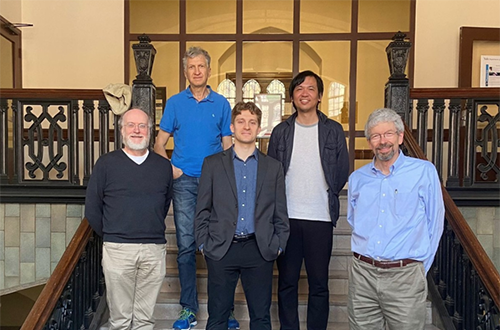
On April 13, 2022, Yale Physics Graduate Student, Joseph Sullivan successfully defended his thesis “Quilting topological phases of matter with quantum thread: a Luttinger liquid love letter” (Advisor: Meng Cheng).
Sullivan explained, “When studying condensed matter systems from a theoretical point of view the conventional approach is to write down a mathematical object called a Hamiltonian which describes the energy of the system. These Hamiltonians are stitched together from building blocks like atoms or quantum spins which are point-like objects. One problem with this approach is that things can get very mathematically complicated very quickly. In this talk we advocate for an alternative method where one-dimensional quantum strings are glued together to model condensed matter systems.”
Sullivan has accepted a postdoctoral fellowship at the Stewart Blusson Quantum Matter Institute at the University of British Columbia in Vancouver.
Thesis Abstract: Kicked off by the discovery of the quantum Hall effect in the early 1980s, the study of topological phases of matter has captured the attention of the condensed matter physics community for over four decades. With topologically ordered phases, symmetry-protected topological phases and, most recently, fracton phases, examples of states of matter beyond the Landau-Ginzburg symmetry breaking paradigm abound. One approach for constructing these novel states of matter is to employ a layered approach; 2-dimensional phases can be built by coupling together 1-dimensional “wires”, 3-dimensional phases can be built by coupling together 2-dimensional “layers” and/or 1-dimensional “wires” and so on. Two major advantages of this approach are its analytical tractability and its ability to describe chiral phases.
In this dissertation we will make use of these constructions to study several new and exotic strongly coupled quantum phases of matter. These include necessarily interacting fermionic symmetry-protected topological phases, chiral fracton phases and stable compressible phases which lack any local order parameter.